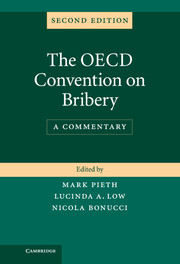Book contents
- Frontmatter
- Contents
- Notes on Contributors
- Foreword
- Acknowledgements
- Abbreviations
- Part I Introduction
- Part II Commentary
- Article 1 The Offence of Bribery of Foreign Public Officials
- Article 2 The Responsibility of Legal Persons
- Article 3 Sanctions
- Article 3(3) Seizure and Confiscation
- Article 4 Jurisdiction
- Article 5 Enforcement
- Article 6 Statute of Limitations
- Article 7 Money Laundering
- Article 8 Accounting
- Articles 9–11 International Co-operation
- Article 12 Monitoring and Follow-up
- Articles 13–17 Final Provisions
- Part III The Convention in Practice
- Annex OECD Documents
- Consolidated Bibliography
- Index
- References
Articles 9–11 - International Co-operation
from Part II - Commentary
Published online by Cambridge University Press: 05 March 2015
- Frontmatter
- Contents
- Notes on Contributors
- Foreword
- Acknowledgements
- Abbreviations
- Part I Introduction
- Part II Commentary
- Article 1 The Offence of Bribery of Foreign Public Officials
- Article 2 The Responsibility of Legal Persons
- Article 3 Sanctions
- Article 3(3) Seizure and Confiscation
- Article 4 Jurisdiction
- Article 5 Enforcement
- Article 6 Statute of Limitations
- Article 7 Money Laundering
- Article 8 Accounting
- Articles 9–11 International Co-operation
- Article 12 Monitoring and Follow-up
- Articles 13–17 Final Provisions
- Part III The Convention in Practice
- Annex OECD Documents
- Consolidated Bibliography
- Index
- References
Summary
Mutual Legal Assistance
Each Party shall, to the fullest extent possible under its laws and relevant treaties and arrangements, provide prompt and effective legal assistance to another Party for the purpose of criminal investigations and proceedings brought by a Party concerning offences within the scope of this Convention and for non-criminal proceedings within the scope of this Convention brought by a Party against a legal person. The requested Party shall inform the requesting Party, without delay, of any additional information or documents needed to support the request for assistance and, where requested, of the status and outcome of the request for assistance.
Where a Party makes mutual legal assistance conditional upon the existence of dual criminality, dual criminality shall be deemed to exist if the offence for which the assistance is sought is within the scope of this Convention.
A Party shall not decline to render mutual legal assistance for criminal matters within the scope of this Convention on the ground of bank secrecy.
Official Commentaries
Article 9 – Mutual Legal Assistance
Parties will have also accepted, through paragraph 8 of the Agreed Common Elements annexed to the 1997 OECD Recommendation, to explore and undertake means to improve the efficiency of mutual legal assistance.
Re paragraph 1:
Within the framework of paragraph 1 of Article 9, Parties should, upon request, facilitate or encourage the presence or availability of persons, including persons in custody, who consent to assist in investigations or participate in proceedings. Parties should take measures to be able, in appropriate cases, to transfer temporarily such a person in custody to a Party requesting it and to credit time in custody in the requesting Party to the transferred person's sentence in the requested Party. The Parties wishing to use this mechanism should also take measures to be able, as a requesting Party, to keep a transferred person in custody and return this person without necessity of extradition proceedings.
- Type
- Chapter
- Information
- The OECD Convention on BriberyA Commentary, pp. 486 - 533Publisher: Cambridge University PressPrint publication year: 2013



